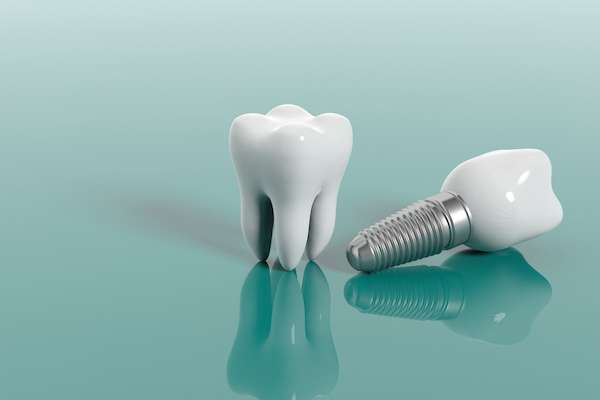 Dental implants are often used to replace individual teeth but can also offer multiple teeth replacement options. Such options include cantilever bridges, implant-supported bridges and implant-supported partials.
Dental implants are often used to replace individual teeth but can also offer multiple teeth replacement options. Such options include cantilever bridges, implant-supported bridges and implant-supported partials.
Dental implant options for patients missing multiple teeth
Depending upon the condition of the person's gums and jawbone, a single implant can sometimes be placed to support two adjacent teeth. More commonly, multiple implants are used to anchor fixed bridges or removable partials.
Cantilever bridge
If a patient needs to replace two adjacent teeth, it is sometimes possible to use one implant with an additional tooth suspended to it. If the teeth are not adjacent, then two implants need to be used.
Implant-supported bridges
An implant-supported bridge can be used to replace two or more teeth on the same arch. This process involves placing multiple implants to serve as supports for the bridge. Implant-supported bridges have a number of advantages over traditional fixed bridges:
- Many patients find them more comfortable, stable and durable, with no gum irritation.
- Patients with insufficient jawbone to support individual implants can use them.
- Support from adjacent natural teeth is not needed.
- The implants act like teeth roots so the jawbone is better preserved.
- Because less deterioration occurs, implant-supported bridges maintain function and appearance for a longer time.
- The bridges do not have to be removed for cleaning or sleep.
- No adhesive is required.
Implant-supported partials
Implant-supported partials function similarly to bridges but are removable rather than being fixed in place. People who are transitioning from traditional partial dentures may find implant-supported partials an easier adjustment than a fixed bridge. This can also be a good option for patients who grind their teeth at night because they can remove the partial, protecting it from potential damage. They are effective multiple teeth replacement options for people who have difficulty brushing and flossing the teeth because the partial can be removed and cleaned outside of the mouth.
The dental implant process
Receiving dental implants is a multistage process that begins with an examination to determine whether the dental implant procedure is right for the patient's needs. The next step is to replace, remove or repair any damaged dental structures. The dentist then uses 3D digital X-rays and dental impressions to create a treatment plan and sends it to a lab to create the prosthetics.
Next, one or more dental implants are inserted below the gum line. Over the next two to six months, osseointegration occurs, which fuses the jawbone to the implants, providing sufficient support for the bridge or partial. Finally, the patient returns to have the bridge or partial placed.
Check out what others are saying about our dental services on Yelp: Dental Services in Long Beach, CA.
Conclusion
Multiple teeth replacement options in the past focused on fixed bridges and partial dentures supported by the patient's natural teeth. Modern dental implants offer an alternative for patients who lack the natural teeth to support traditional bridges or who prefer the advantages offered by implants. Patients can choose between single implants, implant-supported bridges and implant-supported partials based upon their preferences and dental needs.
Request an appointment or call Paramount Dental Care & Specialty at 562-450-1261 for an appointment in our Long Beach office.
Related Posts
Dental crowns are dental restorations that cover teeth entirely for added protection, improved function, and cosmetic purposes. Dental crowns are versatile treatment solutions, and there are many reasons that a dentist may recommend this treatment for patients.The most common reasons that dentists recommend a dental crown are to protect a tooth that is weakened or…
When someone has had a root canal, people usually think of a dental crown as the next procedure. During a root canal, the dentist first drills a tiny hole in the tooth's surface. The infected pulp is then removed, and the inner layer of the tooth is cleaned to remove any residue. Finally, the dentist…
Composite fillings are among the most commonly used materials for restoring teeth affected by cavities or minor damage. These dental fillings repair damaged teeth and restore their function and appearance. While there are several types of fillings besides composite ones, patients may be unsure which one is right for them. Fortunately, a dentist can help.Composite…
